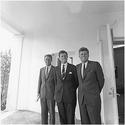Barack Obama's ascension to the presidency won't end racism, but it does mean race is no longer the dominant issue in American politics. Instead, over the coming decades, class will likely constitute the major dividing line in our society—and the greatest threat to America's historic aspirations. This is a fundamental shift from the last century. Writing in the early 1900s, W.E.B. DuBois observed, "The problem of the 20th century is the problem of the color line." Developments in the ensuing years bore out this assertion. read more »
Politics
President Obama, Bring Us Together
The election of Barack Obama signaled the beginning of a "civic" realignment, produced by the political emergence of America's most recent civic generation, Millennials (born 1982-2003). Civic generations, like the Millennials, react against the efforts of divided idealist generations, like the Baby Boomers (born 1946-1964) to advance their own moral causes. read more »
A Bailout For Yuppies
The recent call by the porn industry – a big employer where I live, in the San Fernando Valley – for a $5 billion bailout elicited outrage in other places. Around here, it sparked something more akin to nervous laughter. Yet lending a helping hand to Pornopolis is far from the most absurd approach being discussed to stimulate the economy.
Some influentials close to the administration may even find the porn industry a bit too tangible for their tastes. After all, the pornsters make a product that sells internationally, appeals to the masses and employs a lot of people whose skills are, well, more practical than ideational. read more »
Daschle And State-by-State Healthcare Mistakes
Tom Daschle appears before the Senate this week for confirmation as Secretary of Health and Human Services. While Daschle knows his stuff on health care (see his book, Critical: What We Can Do About the Health-Care Crisis), the discussion is likely to be sidetracked by those who champion a reliance on insurance companies, or on piecemeal reform starting with children. Or, as I’ll discuss here, on a wrong-headed impulse to depend on the states to create new health care models. read more »
Bush: A Disaster to Those He Held Most Dear
You always hurt the one you love
The one you shouldn’t hurt at all
You always take the sweetest rose
And crush it till the petals fall
You always break the kindest heart
With a hasty word you can’t recall
— Allan Roberts and Doris Fisher
Like the 1944 pop standard says, President George W. Bush has hurt the most all those he professed to love the most — from the conservative ideologues and born-again Christians to the free-market enthusiasts, energy producers and red state political class. Perhaps no politician in recent memory has done more damage to his political base. read more »
How Detroit Lost the Millennials, and Maybe the Rest of Us, Too
The current debate over whether to save our domestic auto industry has revealed some starkly different views about the future of manufacturing in America among economists, elected officials, and corporate executives. There are many disagreements about solutions to the Big Three’s current financial difficulties, but the more fundamental debate lies in whether the industry should be bent to the will of the government’s environmental priorities or if it should serve only the needs of the companies’ customers and their shareholders.
But there’s something more at stake: the long-term credibility of Detroit among the rising generation of Millennials. These young people, after all, are the future consumers for the auto industry and winning them – or at least a significant portion of them – over is critical to the industry’s long-term prospects in the marketplace and in the halls of Congress. read more »
Current Policy Overlooks the New Homeless
San Francisco: A Chevron employee is forced to move his family of four into their Mitsubishi Gallant after being laid off…
Atlanta: Jeniece Richards moved from Michigan to Atlanta a year ago, but despite her best efforts, and two college degrees, remains homeless. She is living in temporary housing with her two children and younger brother…
Denver: As Carrie Hinkle’s hours dwindled, she was forced to choose between paying rent or buying food for her daughter. The two are now working with local agencies towards permanent housing, again…
These stories, plucked from the headlines of the past months are more than the typical holiday coverage. They show faces of the newly homeless, growing as the economy crumbles and opportunities fade. read more »
Obama’s First Touchdown: Blue States Take Lead in Bowl Games
What does college football’s schedule of bowl games tell us about American politics?
Here are some unscientific musings on what it all means — figure any football or political point spreads on your own.
Let’s start with this fact: The bowl season would have remained an overwhelming “Red State” affair if Barack Obama had not pulled off his successful raids on Republican territory during the recent presidential election. read more »
- Login to post comments
Stimulate Manufacturing and Production, Not Consumption and Consumerism
As store earnings plunged last week, the National Retail Federation proposed that the country create the mother of all sales by suspending taxes on all purchases. These tax holidays would occur in March, July and October and be national in scope.
The bill, they suggested, should be picked up by – who else? – the federal taxpayer, who would make up for the lost local revenues even for the five states without sales taxes. The rationale, suggests the Federation's chairman, J.C. Penney Chief Executive Myron Ullman III, in a letter to President-elect Barack Obama, would be "to help stimulate consumer spending as one of the first priorities of your new administration." read more »
America Has No Cause to Fear Political Dynasties
It’s been a tough winter for those concerned about dynastic politics.
One-time First Daughter Caroline Kennedy is angling for a Senate appointment from the governor of New York. In Delaware Vice President-elect Joe Biden tapped a longtime aide as a placeholder for the Senate seat he will soon vacate, so his son, state Attorney General Beau Biden, will have a leg up in the 2010 special election. And an oft-mentioned Colorado Senate replacement for Interior Secretary-Designate Ken Salazar is his brother, Rep. John Salazar. read more »
- Login to post comments






















